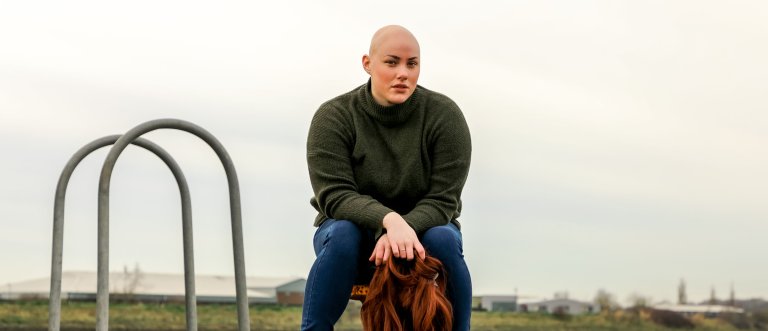Every September, people celebrate Alopecia Awareness Month to shed light on and reduce the stigma around the autoimmune condition. We sat down with Laura Mathias ahead of her stay at YOTEL London City for the annual London Social Meet-Up organised by Alopecia UK to learn about her hair loss journey and how she's built confidence in every aspect of her life, from campaigning to travel hacks.
FOR THOSE WHO ARE NOT AWARE OF ALOPECIA AND ITS DIFFERENT FORMS, HOW WOULD YOU DESCRIBE THE CONDITION AND HOW HAS IT AFFECTED YOU PERSONALLY?
Alopecia is a TEASE – it’s a random autoimmune condition that can develop at any time, causing your hair to thin or fall out. It happened to me when I was 13 years old. My body decided my healthy hair follicles were a threat so started attacking them. I would wake up in the morning with hair all over my pillow as new smooth, small bald patches dotted appeared on my scalp. It was heartbreaking and confusing. I felt ashamed that I looked different. So much so, that I stopped going to school for six months.
AS ALOPECIA AWARENESS MONTH CONTINUES THROUGHOUT SEPTEMBER, WE WANT TO LEARN MORE ABOUT ALOPECIA AND ANY MISCONCEPTIONS AROUND IT. ARE THERE ANY MYTHS YOU'D LIKE TO DEBUNK?
1. Alopecia is an umbrella term for hair loss and there are different types. For many, it can be temporary – a thinning of hair or some small bald patches that will grow back. In rarer cases, like mine, it can develop so that you lose all the hair on your face, head and body (this is called Alopecia Universalis). It can be pretty darn traumatising but hey, it does mean I haven’t had to worry about shaving my legs for about 15 years now!
2. I would love to challenge people who tell me, ‘Hey, at least you save money on shampoo!’. Well, wigs, semi-permanent makeup and lots of other cosmetic items I've felt compelled to use over the years to disguise my hair loss have cost thousands of pounds each year - so it’s not really a fair payoff.
3. Generally, for anyone who tries to comfort someone with hair loss by saying it’s ‘just hair’, I would love them to stop and question how that might belittle the experience. Losing your hair or any kind of ‘visible difference’ can change how people react to you throughout your life. For years, I felt I had to hide behind a wig, say no to adventurous or hot holidays and was terrified to share rooms with friends - all because wearing my wig made it that much harder. It was like carrying around a heavy secret.
IS THERE ANY ADVICE YOU'D GIVE YOUR YOUNGER SELF WHEN YOU WERE FIRST DIAGNOSED?
Don’t wait for your hair to grow back to start living the life you want.
I know it sucks right now, but you are going to get through this. In fact, you will thrive one day. Wearing a wig will be a massive stepping-stone to get you back to school and back to feeling more like ‘you’ again – so don’t feel afraid to ask for a wig when you’re ready (Mum doesn’t want to be the one to ‘suggest’ it!).
And please know that one day, the best thing you will ever do is focus on accepting your alopecia. When that happens you will never again allow yourself to say, ‘I can’t do that because I wear a wig.’ Once you realise people love you for being YOU, not because of your hair, or lack of it, you will feel so much lighter and happier!
AS A FREQUENT TRAVELLER, WHAT ARE YOUR LIFEHACKS AND COPING STRATEGIES FOR TRIPS AND VACATIONS?
Pack things that make you feel at home. I obviously don’t have to worry about making space in my suitcase for special shampoos, hair straighteners, or a razor, so I focus on the other things I can bring that make me feel settled when away from home. With my auto-immune conditions of alopecia, eczema, and asthma I know that a new environment might trigger my allergies and cause these conditions to flare. So, even though one of my favourite things about YOTEL is how clean and fresh the rooms feel, whenever I travel, I bring my own pillowcase and sheet to wrap up in at night. It’s a simple thing I do that has made a huge difference in managing my allergies.
WHAT'S THE BEST THING YOU'VE LEARNT ABOUT YOURSELF THROUGH LIVING WITH ALOPECIA?
There’s no set timeline to what success looks like in life, especially when dealing with obstacles. So be kind to yourself, take a breath, take a step forward and say yes! You might just end up sharing your story to help a whole community of people; working with the media; even modelling at London Fashion Week! These are all things I have learnt I can do, simply by saying ‘Why not me, and why not now?!’
DO YOU HAVE ANY FAVOURITE WEBSITES, BOOKS OR AMBASSADORS WITHIN THE COMMUNITY THAT HAVE INSPIRED YOU?
Gail Porter will forever be an inspiration to me. She lost her hair the year after I did and so, for a long time, was my point of reference for people when explaining what alopecia is. Her no-nonsense approach to living without hair and refusing to wear wigs despite working in the appearance-obsessed world of television was the rebellion I needed to see. Even if, at the time, I wasn’t ready to remove my wig. Seeing Gail unapologetically embrace her alopecia set the groundwork for who I was going to become and my own campaigning work around visible differences.
I now volunteer with the charities Alopecia UK, Changing Faces, and Face Equality International to raise awareness of the need for more representation of hair loss across the media. But, back then, it felt like Gail was a singular voice and I’m so thankful for her.
If you want to learn more about alopecia, head to https://www.alopecia.org.uk/
And, if you want to consider what it’s like to live with any mark, scar or condition that makes you look ‘different’, I recommended the resources and real-life stories on https://www.changingfaces.org.uk/
Laura Mathias is a campaigner, influencer and communications manager on a mission to advocate for those living with any sort of visible difference. Laura shares her story on Instagram @RelightAlopecia.
Image Credit: Debbie Burrows

